
All About the American Bulldog
The American Bulldog might be your perfect companion for several reasons:
- An excellent guard dog, courageous and dependable
- Confident, steady, and fearless
- Intelligent and easy to train
- Energetic, active, and athletic
- Good with children
- Has a short, easy-to-care-for coat
But don't forget about these features:
- Needs a lot of exercise
- Can be rambunctious and rowdy, especially as a younger dog
- Territorial with larger dogs, especially of the same sex
- Must be properly socialized as a puppy to avoid aggression as an adult
- Willful and stubborn if you don’t show strong leadership
- Can be gassy and drool a lot
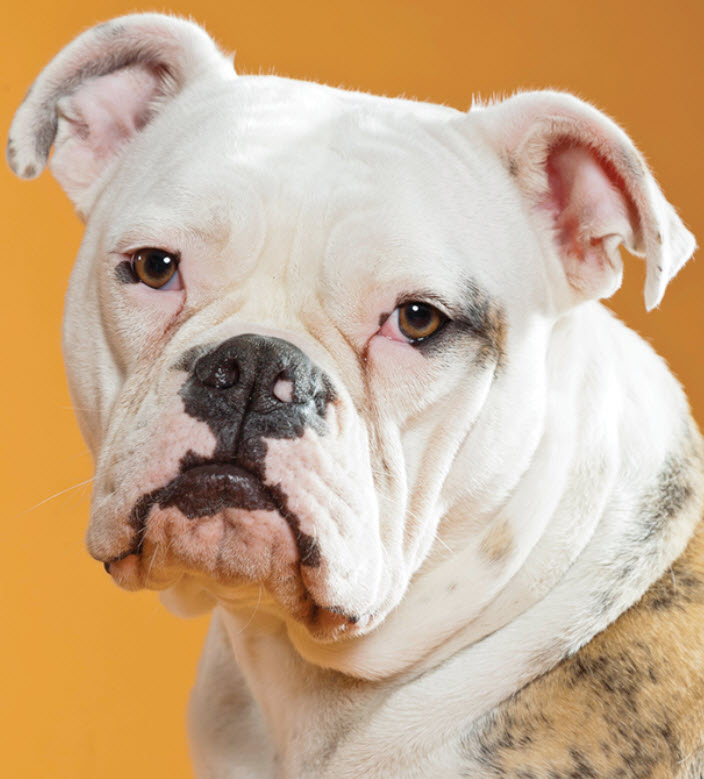 These dogs are known as fearless and steady guard dogs, and they are often territorial. She may prefer to be an only dog.
These dogs are known as fearless and steady guard dogs, and they are often territorial. She may prefer to be an only dog.
The American Bulldog was first bred as a powerful and athletic all-purpose working dog, used to catch hogs and cattle. They are typically gentle and loving family companions, but may not tolerate other dogs, especially those of the same sex. They require early training and socialization and have a high energy level. American Bulldogs are generally healthy with an average lifespan of 10-13 years.
Your American Bulldog's Health
We at Johnson Animal Clinic know that because you care so much about your dog, you want to take good care of her. That is why we have summarized the health concerns we will be discussing with you over the life of your Bulldog. By knowing about health concerns specific to American Bulldogs, we can tailor a preventive health plan to watch for and hopefully prevent some predictable risks.
Many diseases and health conditions are genetic, meaning they are related to your pet’s breed. There is a general consensus among canine genetic researchers and veterinary practitioners that the conditions described herein have a significant rate of incidence and/or impact in this breed. That does not mean your dog will have these problems; it just means that she is more at risk than other dogs. We will describe the most common issues seen in American Bulldogs to give you an idea of what may come up in her future. Of course, we can’t cover every possibility here, so always check with us if you notice any unusual signs or symptoms.
This guide contains general health information important to all canines as well as the most important genetic predispositions for American Bulldogs. This information helps you and us together plan for your pet’s unique medical needs. At the end of the article, we have also included a description of what you can do at home to keep your AmBull looking and feeling her best. You will know what to watch for, and we will all feel better knowing that we’re taking the best possible care of your pal.
General Health Information for your American Bulldog
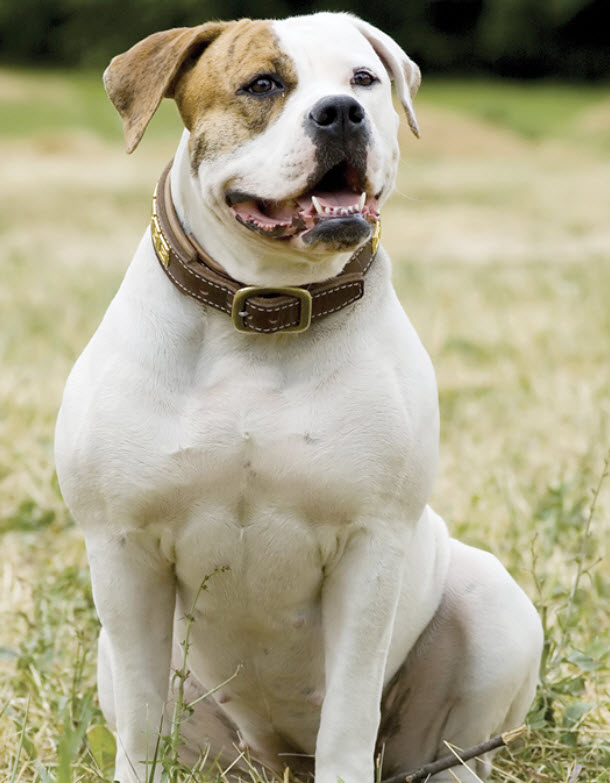 Dental Disease
Dental Disease
Dental disease is the most common chronic problem in pets, affecting 80% of all dogs by age two. And unfortunately, your American Bulldog is more likely than other dogs to have problems with her teeth. It starts with tartar build-up on the teeth and progresses to infection of the gums and roots of the teeth. If we don’t prevent or treat dental disease, your buddy will lose her teeth and be in danger of damaging her kidneys, liver, heart, and joints. In fact, your American Bulldog's lifespan may be cut short by one to three years! We’ll clean your dog’s teeth regularly and let you know what you can do at home to keep those pearly whites clean.
Infections
American Bulldogs are susceptible to bacterial and viral infections — the same ones that all dogs can get — such as parvo, rabies, and distemper. Many of these infections are preventable through vaccination, which we will recommend based on the diseases we see in our area, her age, and other factors.
Obesity
Obesity can be a significant health problem in American Bulldogs. It is a serious disease that may cause or worsen joint problems, metabolic and digestive disorders, back pain and heart disease. Though it’s tempting to give your pal food when she looks at you with those soulful eyes, you can “love her to death” with leftover people food and doggie treats. Instead, give her a hug, brush her fur or teeth, play a game with her, or perhaps take her for a walk. She’ll feel better, and so will you!
Parasites
All kinds of worms and bugs can invade your AmBull's body, inside and out. Everything from fleas and ticks to ear mites can infest her skin and ears. Hookworms, roundworms, heartworms, and whipworms can get into her system in a number of ways: drinking unclean water, walking on contaminated soil, or being bitten by an infected mosquito. Some of these parasites can be transmitted to you or a family member and are a serious concern for everyone. For your canine friend, these parasites can cause pain, discomfort, and even death, so it’s important that we test for them on a regular basis. We’ll also recommend preventive medication as necessary to keep her healthy.
Spay or Neuter
One of the best things you can do for your Bulldog is to have her spayed (neutered for males). In females, this means we surgically remove the ovaries and usually the uterus, and in males, it means we surgically remove the testicles. Spaying or neutering decreases the likelihood of certain types of cancers and eliminates the possibility of your pet becoming pregnant or fathering unwanted puppies. Performing this surgery also gives us a chance, while your pet is under anesthesia, to identify and address some of the diseases your dog is likely to develop. For example, if your pet needs hip X-rays or a puppy tooth extracted, this would be a good time. This is convenient for you and easy for your friend. Routine blood testing prior to surgery also helps us to identify and take precautions for common problems that increase anesthetic or surgical risk. Don’t worry; we’ll discuss the specific problems we will be looking for when the time arrives.
Genetic Predispositions for American Bulldogs
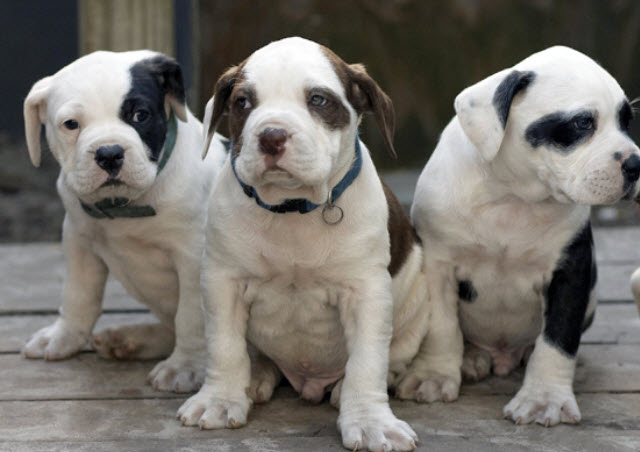 Hip and Elbow Dysplasia
Hip and Elbow Dysplasia
Both hips and elbows are at risk for dysplasia, an inherited disease that causes the joints to develop improperly and results in arthritis. Stiffness in your Bulldog's elbows or hips may become a problem for him, especially as he matures. You may notice that he begins to show lameness in his legs or has difficulty getting up from lying down. We can treat the arthritis—the sooner the better—to minimize discomfort and pain. We’ll take X-rays of your dog’s bones to identify issues as early as possible. Surgery is sometimes a good option in severe and life-limiting cases. Keep in mind that overweight dogs may develop arthritis years earlier than those of normal weight, causing undue pain and suffering!
Nerve Disease
Neuronal Ceroid Lipofuscinosis, shortened to NCL, is a progressive neurologic disease found in several breeds, including your American Bulldog. Clinical signs usually appear in younger dogs, between around one to three years of age. In the early stages, rear leg weakness and imbalance can occur. It can progress to weakness involving all four legs, and some dogs also lose vision. There is currently no effective treatment for this disease, but a genetic test is available. Dogs carrying the mutation should not be used for breeding, since it is readily passed to future generations.
Thyroid Problems
Bulldogs are prone to a common condition called hypothyroidism in which the body doesn’t make enough thyroid hormone. Signs can include dry skin and coat, hair loss, susceptibility to other skin diseases, weight gain, fearfulness, aggression, or other behavioral changes. We’ll conduct a blood screening test annually to screen for the disease. Treatment is usually simple: replacement hormones given in the form of a pill.
Ichthyosis
Dry, flaky, itchy skin is a common problem for many dogs, but AmBulls in particular are prone to a severe flaking skin condition called ichthyosis. Named for the large dry flakes that resemble fish scales, this problem usually arises very early in life, with most affected puppies born with abnormal skin. Several palliative treatment options like special shampoos and fish oils give variable levels of relief, but there is no definitive cure for this inherited disease. There is a genetic test available for many breeds that can determine whether he is clear, a carrier, or affected. This is important information if you are planning to use your friend for breeding, as it is not recommended to breed dogs who are affected or carriers; the goal is to prevent this debilitating disease in future generations.
Eyelid Abnormality
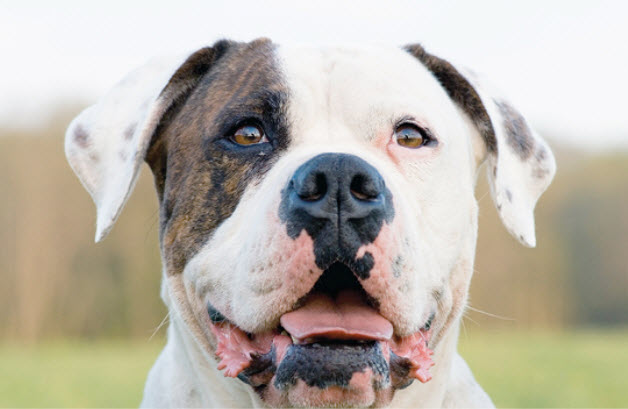 Entropion is a condition where the eyelid rolls inward, causing the eyelashes to rub against the cornea (surface of the eyeball). This is an extremely irritating and painful condition that can ultimately lead to blindness. It can happen in any dog breed; however, your Bulldog is especially at risk for this heritable disorder. Surgical correction is usually successful if performed early.
Entropion is a condition where the eyelid rolls inward, causing the eyelashes to rub against the cornea (surface of the eyeball). This is an extremely irritating and painful condition that can ultimately lead to blindness. It can happen in any dog breed; however, your Bulldog is especially at risk for this heritable disorder. Surgical correction is usually successful if performed early.
Bladder or Kidney Stones
There are a few different types of stones that can form in the kidney or in the bladder, and American Bulldogs are more likely to develop them than other breeds. We’ll periodically test his urine for telltale signs indicating the presence of kidney and bladder stones; they are painful! If your buddy has blood in his urine, can’t urinate, or is straining to urinate, it is a medical emergency. Call us immediately!
Taking Care of Your American Bulldog at Home
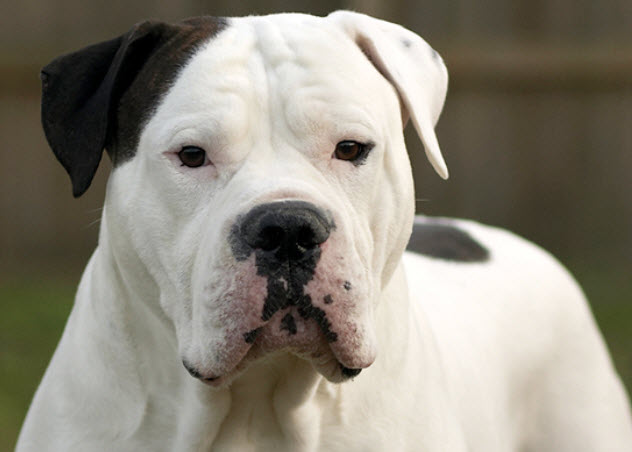 Much of what you can do to keep your dog happy and healthy is common sense, just like it is for people. Watch her diet, make sure she gets plenty of exercise, regularly brush her teeth and coat, and call us or a pet emergency hospital when something seems unusual (see “What to Watch For” below). Be sure to adhere to the schedule of examinations and vaccinations that we recommend for her. This is when we’ll give her the necessary “check-ups” and test for diseases and conditions that are common in Bulldogs. Another very important step in caring for your pet is signing up for pet health insurance. There will certainly be medical tests and procedures she will need throughout her life and pet health insurance will help you cover those costs.
Much of what you can do to keep your dog happy and healthy is common sense, just like it is for people. Watch her diet, make sure she gets plenty of exercise, regularly brush her teeth and coat, and call us or a pet emergency hospital when something seems unusual (see “What to Watch For” below). Be sure to adhere to the schedule of examinations and vaccinations that we recommend for her. This is when we’ll give her the necessary “check-ups” and test for diseases and conditions that are common in Bulldogs. Another very important step in caring for your pet is signing up for pet health insurance. There will certainly be medical tests and procedures she will need throughout her life and pet health insurance will help you cover those costs.
Routine Care, Diet, and Exercise
Build her routine care into your schedule to help your AmBull live longer, stay healthier, and be happier during her lifetime. We cannot overemphasize the importance of a proper diet and exercise routine.
- Supervise your pet as you would a toddler. Keep doors closed, pick up after yourself, and block off rooms as necessary. This will keep her out of trouble and away from objects she shouldn’t put in her mouth.
- Very easy to groom, her short coat requires only occassional brushing. Clean her nasal folds at least weekly.
- American Bulldogs often have serious problems with their teeth, so you’ll need to brush them at least three times a week!
- Clean her ears weekly, even as a puppy. Don’t worry—we’ll show you how!
- She's a smart dog with lots of energy, so keep her mind and body active, or she'll get bored. That's when the naughty stuff starts.
- She has a high prey drive, so she needs to be leash walked and a sturdy fence is a must.
- American Bulldogs love to be with their family and they are adaptable to many living situations as long as they are given adequate exercise.
- Keep your dog’s diet consistent and don’t give her people food.
- Feed a high-quality diet appropriate for her age.
- Exercise your dog regularly, but don’t overdo it at first.
What to Watch For
Any abnormal symptom could be a sign of serious disease, or it could just be a minor or temporary problem. The important thing is to be able to tell when to seek veterinary help, and how urgently. Many diseases cause dogs to have a characteristic combination of symptoms, which together can be a clear signal that your American Bulldog needs help.
Office Calls
Give us a call at (502) 456-2870 for an appointment if you notice any of these types of signs:
- Change in appetite or water consumption
- Tartar build-up, bad breath, red gums, or broken teeth
- Itchy skin (scratching, chewing or licking), hair loss
- Lethargy, mental dullness, or excessive sleeping
- Fearfulness, aggression, or other behavioral changes
- Dull coat, hair loss, sluggish, weight gain
- Dry, scaly, sometimes itchy hairless patches on face or paws
Emergencies
Seek medical care immediately if you notice any of these types of signs:
- Scratching or shaking the head, tender ears, or ear discharge
- Inability or straining to urinate; discolored urine
- Cloudiness, redness, itching, or any other abnormality involving the eyes
- General reluctance to run or play
- Loud breathing, tires easily at exercise
